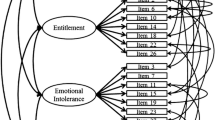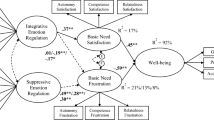Abstract
This study extended earlier research (Harrington in Cong Ther Res 30:699–709, 2006) on the relationship of the multidimensional Frustration Discomfort Scale (FDS) with measures of depressed mood, anxiety and anger, independent of self-esteem. The study employed a non-clinical student sample (N = 323) and measures of both state and trait anger and anxiety. In addition, the Unconditional Self-Acceptance Questionnaire (USAQ) was also used to specifically assess REBT self-acceptance beliefs regarding self-worth, as well as a measure of self-esteem. A Serbian version of the FDS was developed for use in the study. Consistent with the earlier research, significant predictive relationships were found, whilst controlling for self-worth, between entitlement and anger, emotional intolerance and anxiety, and discomfort intolerance with depressed mood. Emotional intolerance also proved to be a significant positive predictor of depression, whilst achievement frustration had a negative relationship with depression. Overall, the FDS dimensions had a weaker relationship with emotional states than traits. The results are discussed in regard to the relationship between FDS dimensions and dysfunctional emotions in a non-clinical sample.
Similar content being viewed by others
References
Arbuckle, J. L., & Wothke, W. (1999). Amos 4.0 users guide. Chicago, IL: SPSS.
Beck, A. T. (1999). Prisoners of hate: The cognitive basis of anger, hostility, and violence. New York: Harper Collins.
Beck, A. T., Rush, A. J., Shaw, B. F., & Emery, G. (1979). Cognitive therapy of depression. New York: Guilford.
Beck, A. T., Steer, R. A., & Garbin, M. G. (1988). Psychometric properties of the Beck Depression Inventory: Twenty-five years of evaluation. Clinical Psychology Review, 8, 77–100.
Bentler, P. M. (1990). Comparative fit indices in structural equation models. Psychological Bulletin, 107, 238–246.
Bond, W. B., & Dryden, W. (2000). How rational beliefs and irrational beliefs affect people’s inferences: An experimental investigation. Behavioural and Cognitive Psychotherapy, 28, 33–43.
Bridges, K. R., & Sanderman, R. (2002). The irrational belief inventory: Cross cultural comparisons between American and Dutch sample. Journal of Rational-Emotive & Cognitive-Behavior Therapy, 20, 65–71.
Brislin, R. (1970). Back-translation for cross-cultural research. Journal of Cross-Cultural Psychology, 1(3), 185–216.
Brown, M. W., & Cudeck, R. (1993). Alternative ways of assessing model fit. In K. A. Bollen & J. S. Long (Eds.), Testing structural equation models (pp. 136–162). Newbury Park, CA: Sage.
Carmines, E. G., & McIver, J. P. (1981). Analyzing models with unobserved variables. In G. W. Bohrnstedt & E. F. Borgatta (Eds.), Social measurement: Current issues. Beverly Hills: Sage.
Chamberlain, J. M., & Haaga, D. A. F. (2001a). Unconditional self-acceptance and psychological health. Journal of Rational-Emotive & Cognitive-Behavior Therapy, 19(3), 163–176.
Chamberlain, J. M., & Haaga, D. A. F. (2001b). Unconditional self-acceptance and responses to negative feedback. Journal of Rational-Emotive & Cognitive-Behavior Therapy, 19(3), 177–189.
Chang, C. E., & Zurilla, J. T. (1996). Irrational beliefs as predictors of anxiety and depression in a college population. Personality and Individual Differences, 20(2), 215–219.
Cohen, J. (1988). Statistical power analysis for the behavioral sciences. Hillsdale, NJ: Lawrence Erlbaum.
Davies, F. M. (2007). Irrational beliefs and unconditional self-acceptance.III. The relative importance of different types of irrational beliefs. Journal of Rational-Emotive & Cognitive-Behavior Therapy. (online first).
DiBartolo, P. M., Frost, R. O., Chang, P., LaSota, M., & Grills, A. E. (2004). Shedding light on the relationship between personal standards and psychopathology: The case for contingent self-worth. Journal of Rational-Emotive & Cognitive-Behavior Therapy, 22, 241–254.
DiGiuseppe, R. (1999). End piece: Reflections on the treatment of anger. Psychotherapy in Practice, 55(3), 365–379.
Dryden, W. (1999). Beyond LFT and discomfort disturbance: The case for the term “non-ego disturbance”. Journal of Rational-Emotive & Cognitive-Behavior Therapy, 17(3), 165–200.
Dykman, B. M., & Johll, M. (1998). Dysfunctional attitudes and vulnerability to depressive symptoms: A 14 Week longitudinal study. Cognitive Therapy and Research, 22, 337–352.
Ellis, A. (1979). ‘Discomfort anxiety’: A new cognitive behavioral construct. Part I. Rational living, 14, 3–8.
Ellis, A. (1980). ‘Discomfort anxiety’: A new cognitive behavioral construct. Part II. Rational living, 15, 25–30.
Ellis, A., & Dryden, W. (1997). The practice of rational emotive behavior therapy (2nd ed.). New York: Springer Publishing Company.
Feldman, L. A. (1993). Distinguishing depression and anxiety in self-report: Evidence from confirmatory factor analysis on non-clinical and clinical samples. Journal of Consulting and Clinical Psychology, 62, 550–559.
Harrington, N. (2005a). The frustration discomfort scale: Development and psychometric properties. Clinical Psychology and Psychotherapy, 12, 374–387.
Harrington, N. (2005b). Dimensions of frustration intolerance and their relationship to self-control problems. Journal of Rational-Emotive & Cognitive-Behavior Therapy, 23(1), 1–20.
Harrington, N. (2005c). It’s too difficult! Frustration intolerance beliefs and procrastination. Personality and Individual Differences, 39, 873–883.
Harrington, N. (2006). Frustration intolerance beliefs: Their relationship with depression, anxiety, and anger, in a clinical population. Cognitive Therapy and Research, 30, 699–709.
Harrington, N. (2007). Frustration intolerance as a multidimensional concept. Journal of Rational-Emotive & Cognitive-Behavior Therapy, 25(3), 191–211.
Ingram, R., & Kendall, P. C. (1987). The cognitive side of anxiety. Cognitive Therapy and Research, 11, 523–536.
Kassinove, H., & Erckhardt, C. I. (1994). Irrational beliefs and self-reported affect in Russia and America. Personality and Individual Differences, 16(1), 133–142.
Kendall, P. C., Haaga, D. A. F., Ellis, A., Bernard, M., DiGiuseppe, R., & Kassinove, H. (1995). Rational-emotive therapy in the 1990 and beyond: Current status, recent revisions, and research questions. Clinical Psychology Review, 15(3), 169–185.
Maric, Z. (2002). Kognitivni cinioci emocije i emocionalnog poremecaja iz ugla REBT. [Cognitive factors of emotion and emotional disorder from rational emotive bihevioral therapy perspective]. Unpublished magisterium thesis, University of Belgrade, Belgrade.
Martin, R. C., & Dahlen, E. R. (2004). Irrational beliefs and the experience and expression of anger. Journal of Rational-Emotive & Cognitive-Behavior Therapy, 22(1), 3–20.
McDermut, J. F., Haaga, D. A. F., & Bilek, L. A. (1997). Cognitive bias and irrational beliefs in major depression and dysphoria. Cognitive Therapy and Research, 21(4), 459–476.
Muran, C. I., Kassinove, H., Ross, S., & Muran, E. (1989). Irrational thinking and negative emotionality in college students and applicants for mental health services. Journal of Clinical Psychology, 45, 188–193.
O’Kelly, M., Joyce, M. R., & Greaves, D. (1998). The primacy of the “shoulds”: Where is the evidence? Journal of Rational-Emotive & Cognitive-Behavior Therapy, 16(4), 223–234.
Rosenberg, M. (1989). Society and the adolescent self-image (Revised edition ed.). Middletown, CT: Wesleyan University Press.
Sheppard, L. C., & Teasdale, J. D. (2000). Dysfunctional thinking in major depressive disorder: A deficit in metacognitive monitoring? Journal of Abnormal Psychology, 109(4), 768–776.
Spielberger, C. D. (1983). Manual for the state-trait anxiety inventory (STAI). PaloAlto, CA: Consulting Psychologists Press.
Spielberger, C. (1999). State-trait anger expression inventory-2: Professional manual. Odessa, FL: Psychological Assessment Resources, Inc.
Tucker, L. R., & Lewis, C. (1973). A reliability coefficient for maximum likelihood factor analysis. Psychometrika, 38, 1–10.
Twenge, M. J., & Campbell, K. W. (2003). “Isn’t it fun to get the respect that we’re going to deserve?” Narcissism, Social rejection and aggression. Personality and Social Psychology Bulletin, 29, 261–272.
Vazic, A. (2005). Bezuslovno prihvatanje sebe i neki aspekti mentalnog zdravlja studenata. [Unconditional self-aceptance and different aspects of mental health in a student population].Unpublished master’s thesis, University of Belgrade, Belgrade.
Author information
Authors and Affiliations
Corresponding author
Additional information
The article is based on a master’s thesis by the first author under the supervision of the second author at University of Belgrade.
Rights and permissions
About this article
Cite this article
Stanković, S., Vukosavljević-Gvozden, T. The Relationship of a Measure of Frustration Intolerance with Emotional Dysfunction in a Student Sample. J Rat-Emo Cognitive-Behav Ther 29, 17–34 (2011). https://doi.org/10.1007/s10942-011-0128-2
Published:
Issue Date:
DOI: https://doi.org/10.1007/s10942-011-0128-2




